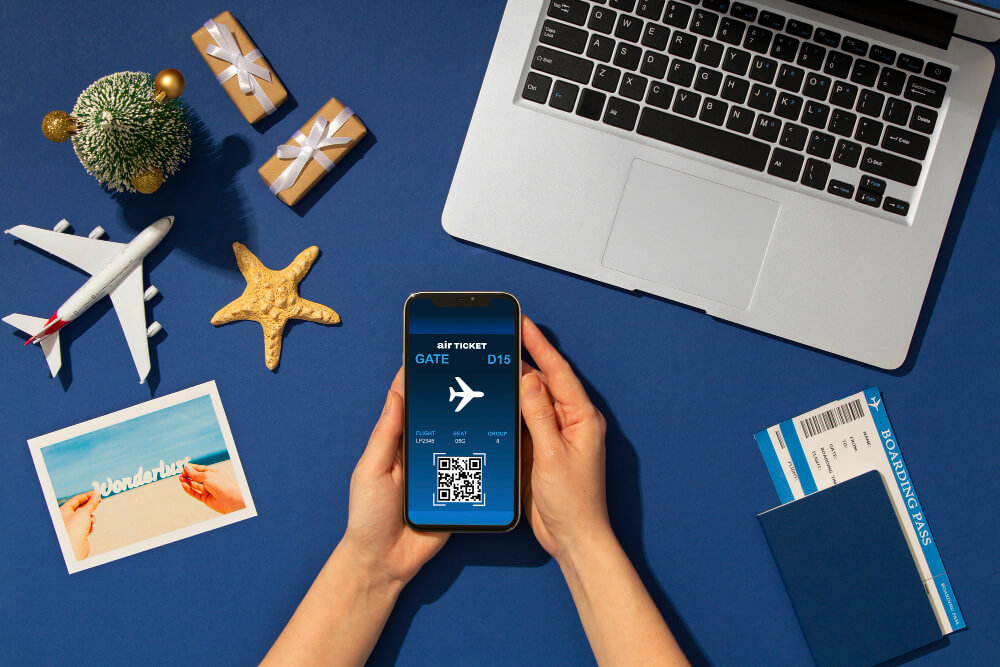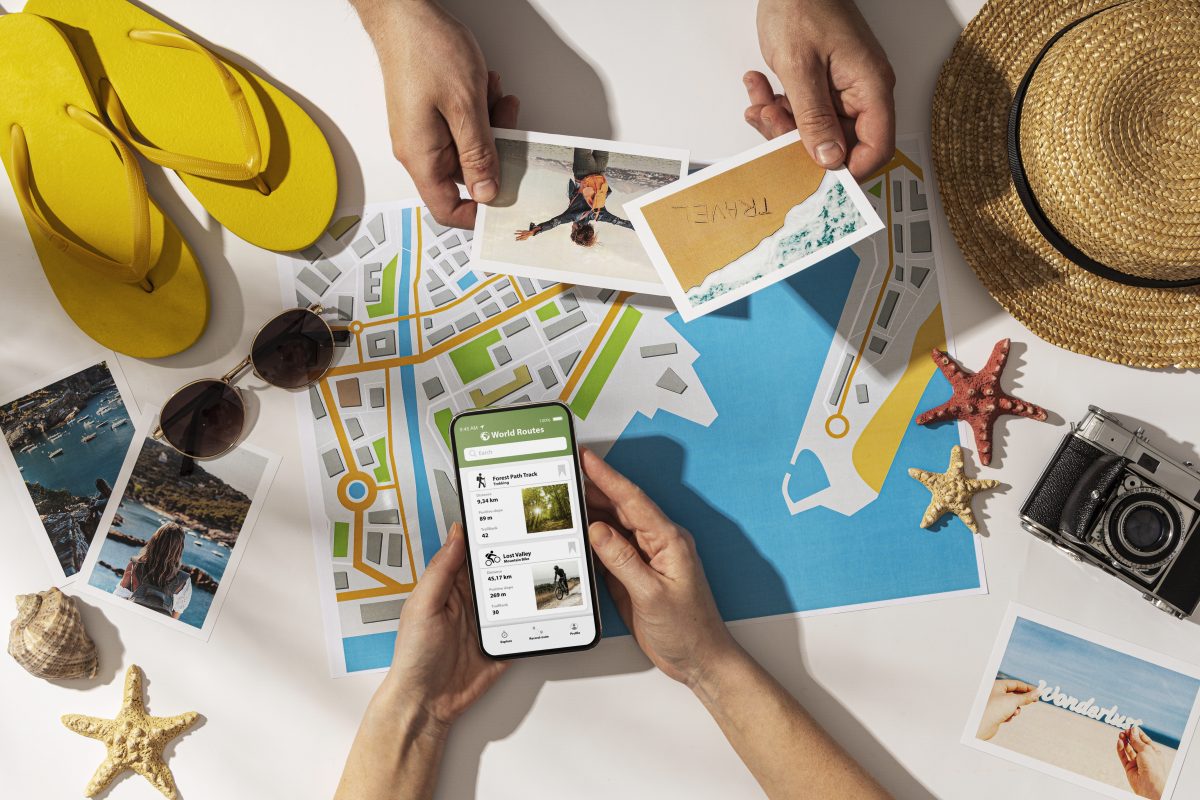In the present era travel businesses are stuck with too many things like fluctuating demand, manual bookings, inconsistent customer support, and overwhelming data.
The result? Missed revenue and poor customer retention. In fact, a recent industry report shows that 23% of travel companies lose repeat customers within 60 days due to inconsistent user experiences.
Now, suppose you are pouring money into marketing, yet your backend can’t support dynamic pricing, real-time personalization, or efficient planning. This isn’t just a bottleneck, it is a big business risk. Based on our analysis of 100+ actual studies, we found that most travel businesses in the USA are behind their expected growth.
But there is a shift happening. Those who act now are seeing higher margins, faster operations, and smarter customer engagement. So, this post will highlight how AI in travel industry is quietly transforming operations.
From generative AI in travel tools to smarter logistics, Vrinsoft Technology- an experienced AI ML development company in USA reveals how Artificial intelligence in travel industry is solving the toughest problems in travel and tourism sector.
How big is the travel AI market?
Let’s take a look at the AI in travel industry market size.
According to a Report: –
- The global AI in tourism market was estimated to be worth USD 3,373.0 million in 2024.
- It is projected to reach USD 13,868.8 million by 2030, growing at a compound annual growth rate (CAGR) of 26.7% from 2025 to 2030.
Important Market Trends & Insights
- Regional Insights- North America is expected to be the largest revenue-generating market in 2024.
- Country Insights- India is anticipated to register the highest CAGR from 2025 to 2030.
- Segment Insights- The solution segment accounted for a revenue of USD 2,705.6 million in 2024.
- Offering Insights- The services segment is the most lucrative, demonstrating the fastest growth during the forecast period.
How AI Is Changing the Travel and Tourism Industry?
Artificial intelligence in travel industry is transforming the sector by providing personalized experiences and streamlining operations. From the planning phase to post-trip support, AI in travel industry is changing every stage of the travel journey.
1. Suggests Customized Destinations and Hotels
AI analyzes individual preferences to recommend personalized destinations, hotels, and activities for each traveler.
2. Instant Support and Answering Queries 24/7
Chatbots and virtual assistants offer instant support, simplifying reservations and answering questions 24/7.
3. Real-Time Prices For Maximizing Revenue
AI adjusts prices in real-time based on demand, seasonality, and competitor rates, maximizing both revenue and value for travelers.
4. Improves Risk Assessment and Fraud Detection
AI improves risk assessment, fraud detection, and airport security through real-time monitoring and facial recognition technology.
5. Reduces Manual Workloads and Minimizes Errors
The use of AI in travel reduces manual workloads, optimizes resource allocation, and minimizes human errors.
6. Forecasts Demand and Latest Travel Trends
AI forecasts demand and travel trends, allowing companies to make better business decisions and improve resource planning.
7. Help Businesses Guest Needs
AI-powered sentiment analysis and market segmentation help businesses understand and meet the needs of their guests more effectively.
When Should You Think of Using AI in Your Travel Business?
You should consider incorporating AI into your travel business if you want to improve personalization, increase operational efficiency, or make data-driven decisions to maintain a competitive advantage.
AI in travel and tourism is particularly beneficial when manual processes hinder growth, customer expectations increase, or you encounter difficulties scaling your services.
1. Data Security Concerns
35% of travel companies identify data security as a significant barrier to AI adoption.
2. Lack of Expertise
34% report that their teams lack sufficient AI expertise and training.
3. Data Quality Issues
33% struggle with poor data quality and inadequate infrastructure, which hinders effective AI deployment.
4. Integration Costs
While generative AI in travel can lower operational costs by 30%, the initial setup requires significant resources.
5. Personalization Demands
63% of travelers expect personalized recommendations powered by AI, raising service expectations.
6. Compliance Complexity
Growing regulatory requirements around data privacy and sustainability make AI rollouts more complicated.
7. Supplier Disruptions
Although artificial intelligence in travel can help, 28% of bookings could face disruptions without robust AI systems in place.
What Are the Benefits of AI in the Travel Industry?
So, how does AI benefit the travel and transportation industry?
Well, AI in the travel industry offers significant benefits by personalizing services, streamlining operations, and improving both customer satisfaction and business efficiency. Its adoption is on the rise.
These are the top ten benefits of AI in tourism: –
- Higher Customer Satisfaction and Loyalty
- Market Growth is Projected To Increase
- Companies Can Reallocate Resources To Customer-Facing Roles
- Increased Demand Forecasting and Profitability
- Improving Response Time and Traveler Satisfaction
- Helps Travelers in Saving Time and Money
- AI Helps Manage Disruptions
- Speeds Up Passenger Verification and Reduces Risks
- Improved Marketing Strategies For Better Outcomes
- Supports Employee Training and Upskilling
Let’s discuss in detail on these ten benefits/advantages of artificial intelligence in tourism: –
1. Higher Customer Satisfaction and Loyalty
Generative artificial intelligence in travel offers personalized recommendations for destinations, hotels, and activities, resulting in higher customer satisfaction and loyalty.
In 2024, nearly 20% of millennials utilized generative AI for trip planning
2. Market Growth is Projected to Increase
The global market for AI in travel is projected to grow from USD 3,373.0 million in 2024 to USD 13,868.8 million by 2030, at a compound annual growth rate (CAGR) of 28.7%.
3. Companies Can Reallocate Resources to Customer-Facing Roles
The automation of tasks such as ticket processing and itinerary changes reduces manual workloads, speeds up service, and minimizes errors, allowing companies to reallocate resources to customer-facing roles.
4. Increased Demand Forecasting and Profitability
AI in travel and tourism forecast demand and optimize pricing in real-time, which increases profitability.
The travel industry’s generative AI market is expected to reach $3.58 billion by 2032.
5. Improving Response Time and Traveler Satisfaction
AI chatbots and virtual assistants manage bookings and inquiries 24/7, improving response times and increasing traveler satisfaction.
6. Helps Travelers in Saving Time and Money
Artificial intelligence in travel and tourism historical and real-time data to forecast trends and suggest the best times to book flights or hotels, helping travelers save money.
For example, Skyscanner’s AI predicts price changes for optimal booking.
7. AI Helps Manage Disruptions
Application of AI in travel and transport aids in managing disruptions (such as delays and cancellations) by automating rebooking processes and adjusting reservations across airlines, hotels, and car rentals, ultimately reducing billions in annual losses.
8. Speeds Up Passenger Verification and Reduces Risks
Application of AI in travel industry improves fraud detection and strengthens security protocols, including facial recognition at airports, which expedites passenger verification and minimizes risks.
9. Improved Marketing Strategies for Better Outcomes
AI analyzes extensive datasets, encompassing customer feedback and booking behaviors.
It allows startups and businesses to refine their offerings and marketing strategies for improved outcomes.
10. Supports Employee Training and Upskilling
AI in travel and transport predicts peak periods and automates staff scheduling, thereby reducing labor costs while maintaining service quality.
It also supports employee training and skills development.
7 Use Cases of AI in Travel and Tourism Industry
So, how is AI used in the travel industry?
AI can be used in the travel and tourism industry by improving efficiency through services such as assistants and chatbots, facial recognition and security, and personalized recommendations.
These are the seven common use of AI in travel industry: –
1. Virtual Assistants & Chatbots
These provide 24/7 support, answer customer queries, and assist with bookings, thereby improving customer service efficiency.
2. Personalized Recommendations
The use of artificial intelligence in travel industry analyzes traveler preferences to suggest custom itineraries, hotels, and activities, which increases customer satisfaction.
3. Dynamic Pricing & Revenue Management
The use of AI in travel industry can predict demand and adjust prices in real-time for flights and hotels, maximizing revenue opportunities.
4. Predictive Analytics
This technology forecasts travel trends, optimizes resource allocation, and anticipates customer needs, leading to better planning.
5. Facial Recognition & Security
It is one of the most common use of AI in travel industry. AI speeds up check-ins and enhances border security using biometric identification, improving overall airport efficiency.
6. Sentiment Analysis
By monitoring and analyzing customer feedback, application of artificial intelligence in travel industry helps improve services and proactively address any issues that arise.
7. Baggage Handling Automation
AI simplifies baggage tracking and management, significantly reducing lost baggage incidents and enhancing airport operations.
5 Successful Examples Of How AI is Used in Travel and Tourism Industry
Leading U.S. companies like Expedia, Marriott International, Outdoorsy are already using artificial intelligence for customer service, dynamic pricing, fraud detection, and customized recommendations.
Given below are the 5 successful AI in travel examples: –
1. Expedia
Uses AI-powered chatbots to assist travelers with bookings and provide instant support. It simplifies the reservation process and improves customer satisfaction.
2. Marriott International
Implements AI-driven dynamic pricing to optimize room rates based on demand and local events, maximizing revenue while offering competitive prices.
3. KAYAK
Employs AI and machine learning for flight price predictions, helping users determine the best time to book flights and save money.
4. TripAdvisor
Features AI-powered virtual voice tours, enabling travelers to explore destinations through smart assistants like Alexa and Google Assistant.
5. Outdoorsy
Utilizes AI to detect fraudulent activities in RV rentals, ensuring safer transactions for both owners and renters.
The Future of Artificial Intelligence in Travel Industry
The future of AI in travel industry is going to offer numerous opportunities for your business.
- Artificial intelligence in travel and transport is changing the industry through innovations that improve personalization, efficiency, and sustainability.
- AI in tourism with travel assistants now offer tailored recommendations, streamline bookings, and provide 24/7 support, creating seamless and customized experiences for travelers.
- Artificial intelligence in tourism now allows startups and other businesses to forecast demand, optimize pricing, and manage disruptions, which improves both operational efficiency and customer satisfaction.
- AI-driven chatbots and smart booking systems automate various tasks, handle rebooking, and deliver instant assistance.
- The integration of AI with technologies such as facial recognition and real-time data sharing further enhances security and convenience.
In a nutshell, the adoption of AI in tourism industry will rise, the industry must balance innovation with data privacy and accuracy to maintain trust while delivering next-generation travel experiences.
Remove Your Dependency on Legacy Systems by Implementing AI in Travel Industry
Are you still relying on outdated systems to manage bookings, customer service, or operations? Well, you are not alone but you are also not ahead.
Legacy systems might have served their time, but today, they limit speed, accuracy, and growth. That is where AI in travel is making a huge difference. From predictive pricing to intelligent customer support, AI in travel and tourism is a profitable strategic move.
At Vrinsoft Technology, we bring 15+ years of industry experience, with 2K+ projects completed and 900+ clients served globally. As a trusted AI ML development company in USA, we offer personalized AI ML development services that help you automate and scale faster.
Whether you are a startup or an enterprise, as an expert AI ML development company, we have the right tools and vision to modernize your digital roadmap.
Do Not Forget- “Innovation is not about ideas. It is all about making ideas work.”
Let’s future proof your travel business, explore our portfolio today.
Start Your FREE Conversation Now
Contact
USA- +1 747 228 3878
India- +91 72279 06117
Email- sales@vrinsofts.com










